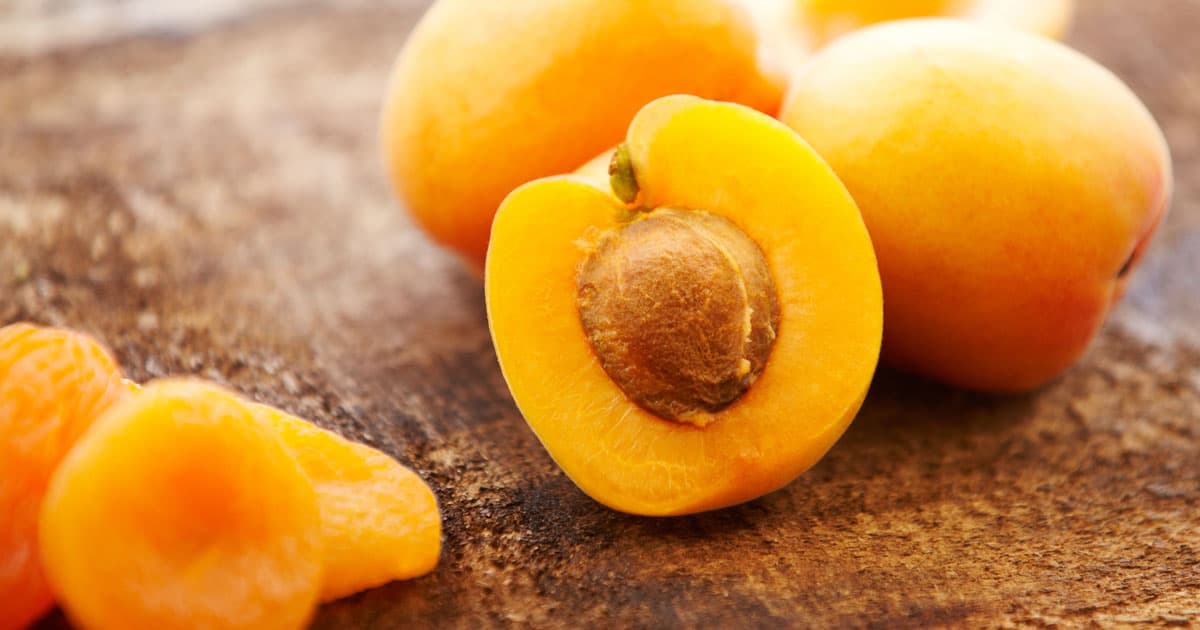
The title “nectar of the gods” is a lofty claim to live up to. Praised throughout history for its health benefits, the juice of the apricot was even claimed during antiquity to give immortal properties. Eaten for millennia as fresh or dried fruit, and even consumed as juice or apricot oil, this relative of the prune has long been associated with health and vitality. While science has yet to uphold any claims of apricots giving eternal life, this nutritious, delicious fruit should still be on your list if you are looking to add a healthy kick to your diet.
Apricots (prunus armeniaca) are absolutely packed with nutrients, which is what earns them a spot on many lists of superfoods. Related to plums and peaches, these delicious fruits are packed with a wide variety of nutrients including:
With the long list of health benefits of apricots, it would be tempting to think that you would want to cram your diet full of them. As with all things, the phrase “too much of a good thing” can apply to these tasty fruits as well. Though your limit will vary depending on your individual dietary needs, eating 3-4 apricots counts as a serving of fruit. How many you should eat will depend on how much other fruit is in your diet.
One limiting factor of how many apricots you can eat in a day is their fiber content. As an excellent source of dietary fiber, apricots can help ease constipation, but having too many can get things moving a bit too freely. This can be a concern with dried apricots, since each fruit still contains the full nutritional value of fresh apricots, but at a seemingly snackable size.
Unlike some fruit that delivers a powerful hit of a few certain vitamins, apricots span the spectrum with nutrients that help with everything from lowering your risk of heart disease to helping boost your immune system. High in antioxidants like vitamins A, E, C, apricots and apricot juice can help prevent the oxidative stress caused on body tissues caused by free radicals. Apricots are also recognized for their anti-inflammatory properties, which can help with chronic inflammation associated with conditions like metabolic syndrome.
The wide range of nutrients in apricots means they can help prevent or ease the symptoms of a wide variety of ailments including earaches, constipation, anemia, certain skin diseases, and more. Adding apricots to your diet may help your cholesterol and blood pressure, both of which have an impact on heart health. Even bone health can be impacted by the nutrients found in these powerful fruits, and apricots are often included in diets designed to help prevent or reduce the severity of osteoporosis.
Carrots may be the food everyone thinks of for eye health, but other foods can help as well. Apricots are naturally a good source of retinol (vitamin A), beta-carotene, and lutein, all of which are linked to better functioning for your eyes. This effect is more pronounced as you grow older, with a diet high in these vitamins helping to stave off ocular deterioration such as macular degeneration.
Some people worry about the sugar content outweighing the other health benefits of apricots. If you are avoiding carbohydrates, dried fruit may not be something to consider, as apricots and many other fruits contain high amounts of simple sugars. It is important to remember that not all sugars are created equal in regard to their effects on your health. The glycemic index of sugars is the measure of how much they affect your blood sugar. Apricots may have a relatively high amount of sugar, but their low glycemic index of 42 out of 100 means that eating apricots will not increase your blood sugar by as much as eating other foods stacked with added sugars. This can be especially important for diabetics or other people with insulin sensitivity.
Perhaps one of the most well-known aspects of apricot nutrition is the dietary fiber this fruit provides. Proper gut motility is essential to the health of your digestive system, and here apricots get high marks. Though apricots can help with constipation due to their insoluble fiber content, they are also high in soluble fiber, which helps lower blood cholesterol levels.
One of the most attractive aspects of the apricot is how shelf stable, nutritious, and tasty it is when dried. Fresh fruit is always the best, but in many situations it is not always practical. Dried apricots have long been a go-to snack or even a nutritional staple for those on the run. They often feature in weight loss diets and are a common food found in outdoor adventures.
Fresh or whole dried apricots are not the only way to get the nutritious benefits of apricots. At FruitSmart, we create the highest quality juices, purees, and essences ready to be included in everything from cocktail mixes and kombuchas to nutraceuticals and more. Our apricot purees are a 100% pure fruit ingredient, which means they are perfect for clean label applications where additives or colorants are a no-go.
If you are interested in learning more about how apricots, or any of our other products, can be used to help answer the challenges you face in creating great food and drink for a competitive market, contact us today to learn more about how we work with our partners to create outstanding, nutritious options your customers will love.
